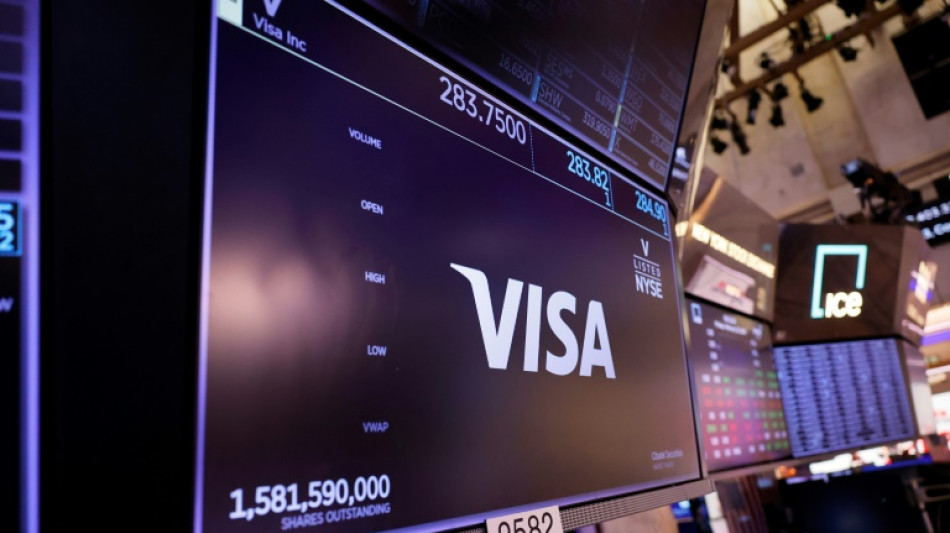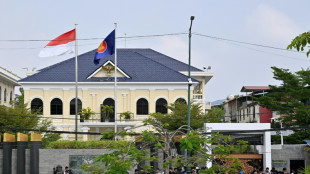
-
 US Republicans begin push to hold Clintons in contempt over Epstein
US Republicans begin push to hold Clintons in contempt over Epstein
-
Trump says agreed 'framework' for US deal over Greenland

-
 Algeria's Zidane and Belghali banned over Nigeria AFCON scuffle
Algeria's Zidane and Belghali banned over Nigeria AFCON scuffle
-
Iran says 3,117 killed during protests, activists fear 'far higher' toll

-
 Atletico frustrated in Champions League draw at Galatasaray
Atletico frustrated in Champions League draw at Galatasaray
-
Israel says struck Syria-Lebanon border crossings used by Hezbollah

-
 Snapchat settles to avoid social media addiction trial
Snapchat settles to avoid social media addiction trial
-
'Extreme cold': Winter storm forecast to slam huge expanse of US

-
 Jonathan Anderson reimagines aristocrats in second Dior Homme collection
Jonathan Anderson reimagines aristocrats in second Dior Homme collection
-
Former England rugby captain George to retire in 2027

-
 Israel launches wave of fresh strikes on Lebanon
Israel launches wave of fresh strikes on Lebanon
-
Ubisoft unveils details of big restructuring bet

-
 Abhishek fireworks help India beat New Zealand in T20 opener
Abhishek fireworks help India beat New Zealand in T20 opener
-
Huge lines, laughs and gasps as Trump lectures Davos elite

-
 Trump rules out 'force' against Greenland but demands talks
Trump rules out 'force' against Greenland but demands talks
-
Stocks steadier as Trump rules out force to take Greenland

-
 World's oldest cave art discovered in Indonesia
World's oldest cave art discovered in Indonesia
-
US hip-hop label Def Jam launches China division in Chengdu

-
 Dispersed Winter Olympics sites 'have added complexity': Coventry
Dispersed Winter Olympics sites 'have added complexity': Coventry
-
Man City players to refund fans after Bodo/Glimt debacle

-
 France's Lactalis recalls baby formula over toxin
France's Lactalis recalls baby formula over toxin
-
Pakistan rescuers scour blaze site for dozens missing

-
 Keenan return to Irish squad boosts Farrell ahead of 6 Nations
Keenan return to Irish squad boosts Farrell ahead of 6 Nations
-
US Treasury chief accuses Fed chair of 'politicising' central bank

-
 Trump rules out force against Greenland but demands 'immediate' talks
Trump rules out force against Greenland but demands 'immediate' talks
-
Israeli strike kills three Gaza journalists including AFP freelancer

-
 US Congress targets Clintons in Epstein contempt fight
US Congress targets Clintons in Epstein contempt fight
-
Huge lines, laughs and gasps as Trump addresses Davos elites

-
 Trump at Davos demands 'immediate' Greenland talks but rules out force
Trump at Davos demands 'immediate' Greenland talks but rules out force
-
Australia pauses for victims of Bondi Beach shooting

-
 Prince Harry says tabloid coverage felt like 'full blown stalking'
Prince Harry says tabloid coverage felt like 'full blown stalking'
-
Galthie drops experienced trio for France's Six Nations opener

-
 Over 1,400 Indonesians leave Cambodian scam groups in five days: embassy
Over 1,400 Indonesians leave Cambodian scam groups in five days: embassy
-
ICC rejects Bangladesh's plea to play T20 World Cup matches outside India

-
 Prince Harry says UK tabloid court battle in 'public's interest'
Prince Harry says UK tabloid court battle in 'public's interest'
-
Trump lands in Davos to push Greenland claims

-
 Balkan wild rivers in steady decline: study
Balkan wild rivers in steady decline: study
-
Injured Capuozzo misses out on Italy Six Nations squad

-
 Mourners pay last respects to Italian icon Valentino
Mourners pay last respects to Italian icon Valentino
-
EU parliament refers Mercosur trade deal to bloc's top court

-
 Odermatt seeks first Kitzbuehel victory with eye on Olympics
Odermatt seeks first Kitzbuehel victory with eye on Olympics
-
Italy's Brignone to be rested for Spindleruv Mlyn giant slalom

-
 Alcaraz spearheads big names into Australian Open third round
Alcaraz spearheads big names into Australian Open third round
-
European stocks dip ahead of Trump's Davos speech

-
 Trump flies into Davos maelstrom over Greenland
Trump flies into Davos maelstrom over Greenland
-
EU won't ask Big Tech to pay for telecoms overhaul

-
 Railway safety questioned as Spain reels from twin train disasters
Railway safety questioned as Spain reels from twin train disasters
-
Marcell Jacobs back with coach who led him to Olympic gold

-
 Syria army enters Al-Hol camp holding relatives of jihadists: AFP
Syria army enters Al-Hol camp holding relatives of jihadists: AFP
-
Brook apologises, admits nightclub fracas 'not the right thing to do'


Visa's 24/7 war room takes on global cybercriminals
In the heart of Data Center Alley -- a patch of suburban Washington where much of the world's internet traffic flows -- Visa operates its global fraud command center.
The numbers that the payments giant grapples with are enormous. Every year, $15 trillion flows through Visa's networks, representing roughly 15 percent of the world's economy. And bad actors constantly try to syphon off some of that money.
Modern fraudsters vary dramatically in sophistication.
To stay ahead, Visa has invested $12 billion over the past five years building AI-powered cyber fraud detection capabilities, knowing that criminals are also spending big.
"You have everybody from a single individual threat actor looking to make a quick buck all the way to really corporatized criminal organizations that generate tens or hundreds of millions of dollars annually from fraud and scam activities," Michael Jabbara, Visa's global head of fraud solutions, told AFP during a tour of the company's security campus.
"These organizations are very structured in how they operate."
The best-resourced criminal syndicates now focus on scams that directly target consumers, enticing them into purchases or transactions by manipulating their emotions.
"Consumers are continuously vulnerable. They can be exploited, and that's where we've seen a much higher incidence of attacks recently," Jabbara said.
- Scam centers -
The warning signs are clear: anything that seems too good to be true online is suspicious, and romance opportunities with strangers from distant countries are especially dangerous.
"What you don't realize is that the person you're chatting with is more likely than not in a place like Myanmar," Jabbara warned.
He said human-trafficking victims are forced to work in multi-billion-dollar cyber scam centers built by Asian crime networks in Myanmar's lawless border regions.
The most up-to-date fraud techniques are systematic and quietly devastating.
Once criminals obtain your card information, they automatically distribute it across numerous merchant websites that generate small recurring charges -- amounts low enough that victims may not notice for months.
Some of these operations increasingly resemble legitimate tech companies, offering services and digital products to fraudsters much like Google or Microsoft cater to businesses.
On the dark web, criminals can purchase comprehensive fraud toolkits.
"You can buy the software. You can buy a tutorial on how to use the software. You can get access to a mule network on the ground or you can get access to a bot network" to carry out denial-of-service attacks that overwhelm servers with traffic, effectively shutting them down.
Just as cloud computing lowered barriers for startups by eliminating the need to build servers, "the same type of trend has happened in the cyber crime and fraud space," Jabbara explained.
These off-the-shelf services can also enable bad actors to launch brute force attacks on an industrial scale -- using repeated payment attempts to crack a card's number, expiry date, and security code.
The sophistication extends to corporate-style management, Jabbara said.
Some criminal organizations now employ chief risk officers who determine operational risk appetite.
They might decide that targeting government infrastructure and hospitals generates an excessive amount of attention from law enforcement and is too risky to pursue.
- 'Millions of attacks' -
To combat these unprecedented threats, Jabbara leads a payment scam disruption team focused on understanding criminal methodologies.
From a small room called the Risk Operations Center in Virginia, employees analyze data streams on multiple screens, searching for patterns that distinguish fraudulent activity from legitimate credit card use.
In the larger Cyber Fusion Center, staff monitor potential cyberattacks targeting Visa's own infrastructure around the clock.
"We deal with millions of attacks across different parts of our network," Jabbara noted, emphasizing that most are handled automatically without human intervention.
Visa maintains identical facilities in London and Singapore, ensuring 24-hour global vigilance.
E.Burkhard--VB
